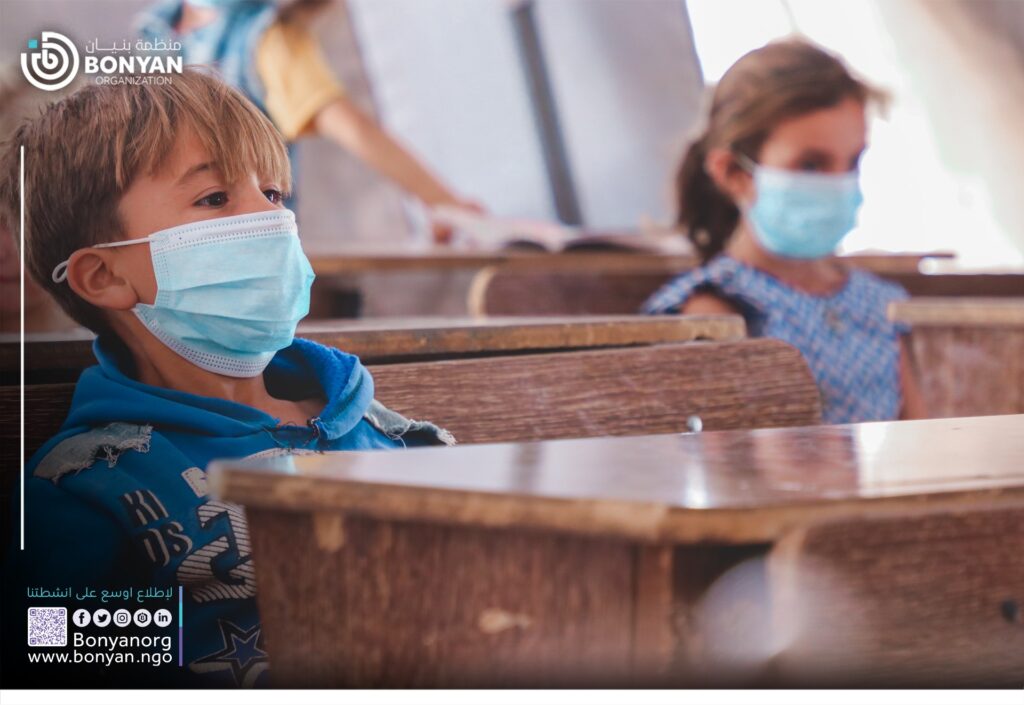Refugee students now face several mental health issues that they experienced prior to their resettlement and immigration.
Such traumatic experiences have affected their academic as well as their behavioral conduct. As a result, Bonyan Organization works on funding the necessary initiatives in order to improve the mental health of those students.
This article sheds light on some key aspects related to understanding the traumas of refugee students.
Understanding Trauma and Its Effects on Refugee Students
Trauma can affect refugees on many levels, such as individual, classroom, and family levels.
That is, many refugee students have experienced different styles of schooling and limited or no previous schooling, which could affect their mental health, causing trauma.
Traumatic experiences often exhibit themselves among refugee students in stress, depression, grief, fear, and isolation, to mention a few.
Kinds of educational experiences that might affect refugee students include:
- Major disruptions in schooling due to different reasons, including war, displacement, or resettlement.
- Constrained access to school supplies and educational resources.
- Exposure to a cruel kind of behavioral discipline, including corporal punishment.
The Role of Schools in Addressing The Mental Health Needs of Refugee Students
Schools play a significant role in addressing refugee students’ mental health issues. Below are some tips that might help educators in dealing with refugee students:
- Understanding and recognizing the stressors: Refugee students might be tackling different mental issues from their premigration experiences.
They may have been exposed to violence at home, displacement, malnutrition, torture, or detention.
- Understanding the effect that traumatic experience might have on refugee students’ school functioning: Mental issues might affect the school functioning of refugee students in various ways, which include the following:
- Poor concentration.
- Cognitive functioning.
- Weak memory.
- Difficulty in making social relationships.
- Aggression with their peers.
- Conduct problems.
- Anger management problems.
- Equipping the educational staff with the necessary skills and knowledge to deal with refugee students: Is key to creating trauma-sensitive schools which can effectively support refugee students. This can be one of the many steps, including:
- Building trustworthy relationships between the teachers and students.
- Helping students to regulate their behaviors and emotions.
- Supporting students to improve their performance at school and outside of school.

Building Trust and Cultural Sensitivity in Working with Refugee Students
Building trust and cultural sensitivity in school environments is key in dealing with refugee students and integrating them into the new school environment.
This could be conducted through the following techniques:
- Increasing the self-awareness of the teaching staff and refugee students’ peers of their biases toward Others.
- Designing special programs and events to welcome new refugee students.
- Building connections and community partnerships with refugee students’ families.
Supporting Positive Coping Strategies Among Refugee Students
Supporting coping strategies to help refugee students overcome their traumas is undoubtedly necessary and essential.
School counselors and psychologists should allow those students to voice their opinions, issues, and concerns.
In addition, the teaching staff and the school counselors should work on creating an atmosphere that fosters safety, trust, and communication between refugee students and their peers.
Employing experienced psychologists who have the skills, knowledge, and abilities to help refugee students conquer their traumas, integrate with their peers and excel in their studies.
Help us promote a welcoming environment for refugee students in their new schools in order to overcome their fears, stressors, and traumatic experiences.
Your donations can help refugee students overcome their mental issues and restore their normal life.
To this end, don’t hesitate to make a difference in a refugee student’s life!
Support our campaigns at this link: (click here)
Resources
- Supporting Refugee Children & Youth: Tips for Educators.
- Culturally responsive practices for supporting refugee adolescents.
- Understanding Refugee Trauma:For School Personnel.
FAQs
What are the mental health concerns of refugees?
The mental health concerns for refugees are:
Anxiety disorders.
Depression.
Post-traumatic stress disorder (PTSD).
Panic attacks.
Adjustment disorders.
What are some of the factors that impact the mental health of refugee children?
Some of the factors that impact the mental health of refugee children include:
Lack of knowledge about the host country.
The traumas they got exposed to due to wars and conflicts in their original countries.
Linguistic obstacles.
How can we help children refugees?
We can help refugee students by equipping schools with counselors and teaching staff who understand the psychological needs of the refugee students and who can promote an atmosphere of safety and trust for them.



